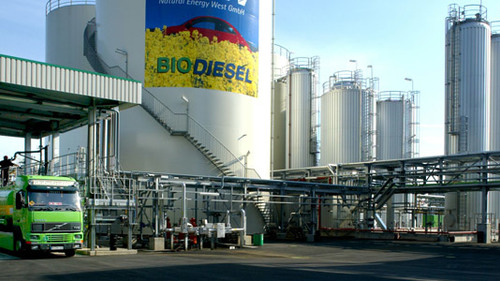Evonik launches next-generation biofuel component at Marl, Germany
With a biological version of a premium antiknock agent in its portfolio (methyl tert-butyl ether, or MTBE), Evonik now offers oil companies a new option for significantly increasing the biocontent of their fuels and reducing their carbon footprint. "Bio-MTBE is the only commercially available, next-generation biofuel component for gasoline in Germany," explains Dr. Rainer Fretzen, who heads the Performance Intermediates Business Line at Evonik. "And it doesn't compete with food production, either." Bio-MTBE is produced in Marl (Germany) along with conventional MTBE.
Evonik produces Bio-MTBE from isobutene and biomethanol. Because it is made from raw glycerine, which is itself a co-product of the biodiesel manufacturing process, biomethanol is classified as a waste product according to the EU Renewable Energy Directive (RED)—doubling its value for determining bioenergy content. That makes Bio-MTBE a promising option for fuel manufacturers looking to meet EU specifications for biofuel use and CO2 reduction.
MTBE has been a trusted antiknock agent for decades, and Bio-MTBE possesses the same technical advantages as its conventional counterpart: high energy density (86 percent of gasoline), low vapor pressure, low oxygen content, and very low solubility in water. That translates to excellent compatibility with other gasoline components and to its well-known positive effect on gasoline quality. It also means that Bio-MTBE can be handled safely in refineries and storage tanks and be conveyed by pipeline.
While Evonik has primarily sold Bio-MTBE in Germany and the Netherlands, implementation of EU directives in other member states promises additional growth potential for this next-generation biofuel component. If needed, Evonik could shift the full capacity of its plant (550,000 metric tons per year) over to production of Bio-MTBE.
Categories
Countries
Companies
Latest news
INEOS launches €250m investment supported by the French Government to secure the future of French industry at Lavera
The project marks the first phase of a long-term regeneration plan to reduce emissions, boost reliability, efficiency and competitiveness, with support of the French State.
Hycamite’s technology to decarbonize shipping awarded AiP by industry leader DNV
Kokkola Industrial Park →Hycamite’s proprietary Thermo-Catalytic Decomposition (TCD) technology offers a new approach to producing clean hydrogen by breaking down methane, the primary component of liquefied natural gas (LN...
Clariant catalysts will power the Ecoplanta: Europe's first waste-to-methanol plant
Chemmed Cluster Tarragona →Repsol is building Europe’s first plant to produce renewable methanol from urban waste The facility will use Enerkem gasification technology to produce 240 KTA of methanol Clariant will supply cata...
Lilly plans to build a new $3 billion facility to boost oral medicine manufacturing capacity in Europe for patients worldwide
Netherlands site will bring 500 manufacturing and 1,500 construction jobs while further strengthening Lilly's global supply chain

